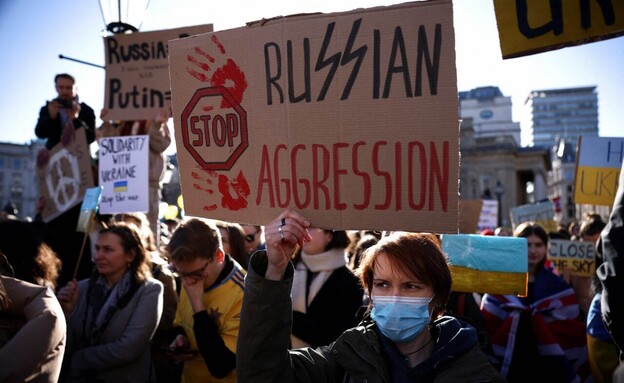I planned to plant tulips and daffodils on my backyard today. Instead, I learn to fire arms and get ready for the next night of attacks on #Kyiv. We are not going anywhere.
This is our #cityour #landour soil. We will fight for it. So next week I can plant my flowers. Here. pic.twitter.com/TCMGogKVt5
— Kira Rudik (@kiraincongress) February 26, 2022
Roddick probably has not yet planted the daffodils and while the war in Ukraine goes on and on, many of us who continue to live a routine life feel a sense of discomfort in relation to the fact that with them everything continues to go on as usual. There is something bothersome about going out to dinner with friends or making plans for the weekend while we know so many people are in a completely different situation.
“Do not reduce your pain”
A sense of guilt has been activated in many of us over the past two years. The “insolence” of enjoying life in times when there are many people who suffer can feel morally wrong, and the guilt reflects a natural mechanism of sharing in the pain of others, even if we are not directly affected by it. Beyond the hard feelings, recent events can raise value questions, like how complacent we are and whether we are doing enough, or at all, when so many people are hurt.
Psychotherapist Lori Gottlieb shared a conversation she had with a patient about the war. “I really should not feel so depressed,” the patient said. “I mean, people are dying in Ukraine and I’m lucky to be safe.” Gottlieb responded, “Could there be a war * and * that would make you feel depressed?”. It was not something her patient weighed.
“There is so much suffering in the world, whether it is because of war or Corona or the many other tragedies we face,” Gottlieb wrote. “But please do not reduce your pain just because you do not think it is too severe compared to anything else.”
Patient: I really shouldn’t feel so depressed. I mean, people are dying in Ukraine but I’m lucky to be safe.
Me: Can there be a war *and* you feel depressed?
Patient (crying): Oh. I never considered that.
— Lori Gottlieb (@LoriGottlieb1) March 1, 2022
In recent weeks, many have shared a quote from writer and illustrator Marie Andrew that describes in brief and precise words the complexity of the moment, including: “Someone always rattles a cocktail glass in one hemisphere when someone loses a house while another falls in love with the same apartment building.” Overlapping is unbearable and amazing. ”
Andrews wrote the short piece in response to wildfires in Australia in early 2020. “I wanted to remind myself how the world has always been this way: but and beauty happen at the same time,” she said. “It’s so confusing to grasp, but it helps to understand our context in history, how it’s not new. We now have a lot more access to the news, but there have always been horrors and wonders at the same time.”
“It’s horrible that people in Ukraine suddenly can not enjoy a simple weekend at home,” said the illustrator. “But our refusal to enjoy is not as helpful as giving what I can and helping with what I can – small actions that show I care about them. To refuse to enjoy or not to take care of ourselves is simply to succumb to this terrible hopelessness.”
Beautiful words by @bymariandrew. I was on the inside looking out 10 yrs ago, wondering how others were brushing their teeth or decorating for the holidays while I grieved the loss of my son. Now I’m doing the mundane while the people of Ukraine fight for their lives & country. pic.twitter.com/KaKK5sInCA
— Your therapist friend (@Yourtherapistf1) March 2, 2022
And finally, another thing that is important to remember is that no one will think you are out of date or careless if you do not have something interesting to say about the roots of the Russia-Ukraine war, the threat of nuclear war or the idea of a no-fly zone. It is also possible from time to time to move away from the screen and stop the flow of reports for a moment, because taking care of our own mental health is certainly not an act that indicates selfishness.
